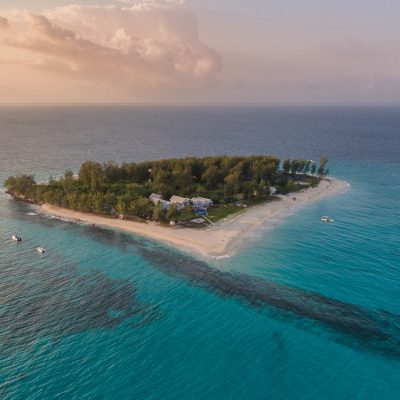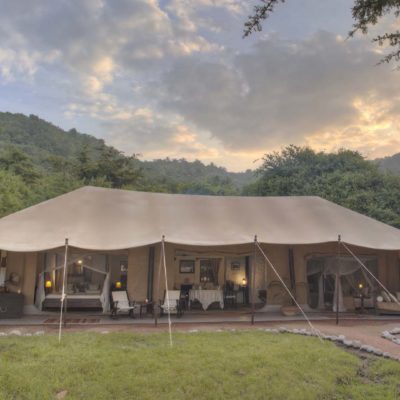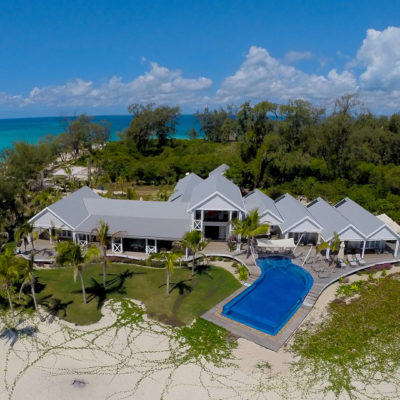Cottar’s 1920s Safari Camp is situated in a private 7608-acre conservancy which borders the Maasai Mara and the Serengeti. Owned and managed by the Cottar family, the camp is luxurious with 1920s touches of glamour, yet still feels like an authentic safari camp. Warmly lit ‘mess areas’ offer the perfect place for guests to enjoy a drink or meal with the other guests and form new friendships through your shared safari experience.
The camp only accommodates 28 guests when at capacity, add on to this the location in a private conservancy and you have a camp which is intimate and exclusive. The tents come complete with large, comfortable beds, vintage furniture, and their own private veranda where guests can spend the evening relaxing and marvelling at the pristine nature and rolling hills rising from the horizon. Explore the Cottar’s conservancy on a game drive or on foot keep[ing your eyes peeled for lions, hyenas, elephants, giraffes and cheetah.
Cottar's 1920s Camp
Cottar’s Private Conservancy is 7608 acres of pristine, untouched wilderness. With the rich ecosystems of the Maasai Mara extending to encompass the conservancy, travellers will be astounded at just how much wildlife inhabits the area. Animals that inhabit the area include lion, cheetah, hyena, leopard, elephant, giraffe and over 450 bird species. If you are lucky you may even spot some rhinos – the South East Mara system holding the densest population of them.
The Cottar’s Private Conservancy borders the Mara, LoBiondo and the Serengeti reserves allowing for the diversity of landscapes and animals; from July to November the annual migration of zebra and wildebeest is outstanding, with millions crossing the Serengeti into the Mara. The untouched land surrounding the camp creates the perfect habitat for all of these animals and there are no fences or limits on where they can go. The landscape is luscious and green, with tall trees dotted over the plains and hills rising in the distance.
Guests can access the camp by flying into Cottar’s private airstrip which is a ten-minute drive from the camp.
- Located in Cottar’s Private Conservancy
- Part of the Serengeti, LoBiondo and Mara ecosystems
- Pristine, untouched wilderness
- Camp décor is inspired by a 1920s safari, glamorous yet organic and natural
- Tents include four-poster beds and vintage furniture
- Dine communally in the mess tent or dine al fresco in the bush
- Explore the area with knowledgeable and local guides
- Relax in the swimming pool or with an indulgent spa treatment
Owned by the Cottar family, Cottar’s 1920s Safari Camp is a camp which hails back to the day when the family first entered the safari business. Operating luxury safaris since 1919, over 9 decades of this time has been spent as part of the Mara community. Cottar’s 1920s Safari Camp has countless accolade such as being a Global Eco-sphere Retreat, receiving the Green Globe award for their environmentally friendly practices, all the way to being named the ‘Best Tented Camp in the World.’
The weather at Cottar’s 1920s Safari Camp usually consists of warm and dry days, however there are long rains which fall from April to May. Whilst these rains may create wetter and slightly more treacherous conditions for game drives, the rain clears the air of dust so visibility is good and the short dramatic rain showers set the scene for some breathtakingly dramatic sunsets.
There are shorter rains which fall in November but aside from this the year tends to remain dry. Game drives are more accessible with dryer conditions and if you are lucky enough to find a small stream or waterhole on your exploration expect to see animals gathered round having a refreshing drink. Temperatures are usually steady, warm in the day and cooler in the mornings and evenings – especially from June to September – so a warm jumper or jacket is advised.
For couples looking for a romantic and luxury stay, the honeymoon suites are ideal. Spacious and airy tents are decorated in a traditional safari style with vintage furniture and a chandelier adding a touch of 1920s glamour. The tents can be open sided with canvas doors which can be rolled back to reveal the stunning surroundings. The space feels warm and inviting with a large four-poster bed sat at one end of the tent, with crisp white bed linens. From the comfort of your own bed, you can enjoy the sunset as the warm evening rays illuminate the tent.
There is a lounge area with comfortable seating where guests can relax with a view over the breathtaking Maasai Mara plains. Guests will have no shortage of space with an ensuite dressing area and an ensuite bathroom adding touches of luxury and elegance. At the end of a long day exploring relax on your private veranda and see if you can spot any animals meandering past.
The double tents at Cottar’s 1920s Camp are luxurious and comfortable. Tents come complete with a king-size four-poster bed or two single four-poster beds, all draped in mosquito netting lending a romantic feel to the space. The tents are bright and spacious, filled with natural light and a fresh Kenyan breeze from the wide netted windows and fold back canvas doors. The colour palette which runs throughout the tent is neutral with splashes of traditional African colours and patterns. An ensuite bathroom offers home comforts and a separate dressing area for guests. A private veranda offers mesmerising views over the luscious green of the Maasai Mara and the rolling hills emerging in the distance.
The family suites at Cottar’s 1920s Camp are open plan and include a bedroom at either end with their own ensuite dressing areas and bathrooms. A cosy four-poster bed draped in mosquito netting lies at one end and at the other lie two single four-poster beds, similarly draped in mosquito netting. An extra bed can be added if required. A neutral colour palette runs throughout the tent, making the space feel luxurious and comfortable whilst cleverly leaving the colour and intricate details to the stunning surroundings.
Wide floor to ceiling windows run along the side of the tent, allowing natural light and fresh air to fill the tent. Also included in the tent is a spacious living/dining area with a fireplace where the whole family can relax and acts as a room divider between the two bedroom areas. A veranda on each side of the tent offers the perfect place for some privacy and an excellent spot to take in your unique surroundings and marvel at the luscious trees and rolling hills of the Maasai Mara.
Guests can enjoy mealtimes in the main mess tent, lavishly decorated in a traditional safari style with 1920s glamour touches, such as chandeliers and an understated art-deco bar. Communal dining is encouraged, round large wooden dining tables lit by candlelight and warm lamps in the evening, however, private dining can be arranged. Guests can enjoy exquisitely prepared meals from a set daily menu and fine wines to pair with it. Before or after dinner guests can relax in the lounge area on comfortable armchairs and squishy sofas enjoying a refreshing cocktail or a glass of wine.
Dinner can be set up in the camps own private conservancy for a unique dining experience and a once in a lifetime opportunity to eat fine food whilst surrounded by the sights, smells and sounds of the Kenyan wild. The evening is started with a sundowner by a crackling fire and finishes under the dazzling stars, with drinks and traditional singing and dancing from local Maasai warriors.
Game Drives are offered from the camp. This is an enjoyable and comfortable way to explore the private conservancy in which the camp is situated. In open-sided 4×4 vehicles, guests can relax and keep their eyes peeled for movement in the bushes. This is an excellent way to get up close and personal with the wildlife without disturbing them and being in a private conservancy means you are unlikely to come across any other tourists. Guests may see rhino, lion, gazelle or zebra as well as night drives offering an opportunity to see some nocturnal animals such as aardvark, porcupines and white-tailed mongoose.
For a more intimate exploration of the conservancy, explore on foot. With walks led by professional guides, this is an opportunity to immerse yourself in the bush and view animal footprints and micro-ecosystems. The guides can teach you about entomology and botany and can spot hidden birds and nests which would go unnoticed by anyone else. Guests can spend time walking with Letilet who is a Maasai/Dorobo hunter-gatherer and learn about Maasai and El Dorobo traditions and ways of life. Letilet will also share with you the medicinal uses of the flora and fauna.
Engage in the local culture and community surrounding Cottar’s 1920s Safari Camp with a trip into the local Maasai village. You will be toured around their Manyattas and the whole village, including the local market where you can purchase Maasai artefacts. This is a once-in-a-lifetime opportunity to learn about their way of life. A trip to the local school can also be arranged for guests who might want to sit in on a lesson or play a game of football with the village.
An activity that is fun for the whole family is taking part in the Maasai Warrior School. Guests will be taught how to throw a spear, use a bow and arrow, track animals and learn traditional Maasai dancing and singing with the wild African bush as their unique classroom.
There are various activities on-site for guests who wish to have a quieter day. Canvas baths can be set up outside guests’ tents so you can bathe outside with a view of the stunning surroundings, or guests can choose to take a refreshing dip in the sparkling infinity swimming pool. For the ultimate relaxation, guests can visit the spa and choose from one of the self-indulgent spa treatments.
Having been in the safari industry for just over 100 years, Cottar’s vision for the future is to remain “financially successful and sustainable for the next 100 years.” They strive to honour their family tradition of ensuring a legacy of “wilderness, wildlife, comfort and security” whilst supporting the local communities, culture and conservation – all while offering authentic and memorable safari experiences. With an emphasis on responsible travel they believe that there can be a balance found between a “prosperous business and sustainable conservation, social entrepreneurship, and community development.”
Cottar’s joined The Long Run in 2012. The Long Run is an organisation whose members are all sustainably driven tourism businesses. Since joining, they have been committed to what The Long Run call the ‘4Cs’; community, culture, conservation and commerce. Cottar’s own conservation trust supports the private Olderkesi Wildlife Conservancy and has been engaged “in the preservation of natural habitats and wildlife in the area and in securing the area from poachers.”
A close relationship is maintained between Cottar’s and the local communities, with the communities themselves being supported through ownership of the land. Working together with members of the Maasai communities the Cottar family manage the Maasai land at rates which are competitive and fair, which helps to provide “conservation as an alternative livelihood opportunity.” The local culture of the Maasai community is preserved and celebrated, with Cottar encouraging their guests to get involved and immerse themselves in the local culture.
Involving the local community in any development is of utmost importance to Cottar’s. The majority of employees are from local communities, which helps to provide an income that can support whole families – not just individuals. Local clinic visits are organised and conducted by volunteer groups providing health and social care to the local communities, who might not receive it otherwise. A footbridge was built in partnership with Bridging the Gap Africa, so people could cross the San River during floods without risking their lives. Olpalagilagi Primary School was built by Cottar’s, which can hold 200 students with the teachers being paid for. A feeding program is also run to make sure staff and students receive a nutritious lunch.
Thanks to the Cottar’s Wildlife Conservancy Trust (CWCT), the land of the Olderkesi Conservancy is protected and kept wild. The 7608 acres of the conservancy is owned by 6000 landowners for the Olderkesi area and the CWCT has leased the land. The rent they pay exceeds “what could be charged by subdividing the land with fences” keeping the area open for wildlife to roam. The payments are received by the entire community making sure everyone benefits.
The result is that the leased land is left untouched creating a “safe habitat and passage for wildlife.” As well as making sure this land is protected the CWCT has helped build schools and provided medical care, employed members of the local communities as security scouts, built troughs for cattle, installed communication networks, and “provided bursaries and local assistance to protect local cedar forests from predatory logging.”
Cottar’s is partnered with the African Wildlife Foundation to help support their development and conservation efforts. For almost 60 years AWF’s vision has been “of an Africa where sustainable development includes thriving wildlife and wildlands as a cultural and economic asset for Africa’s future generations.” AWF helps to advise Cottar’s Wildlife Conservation Trust on how best to develop their conservation efforts and also acts as a fundraising extension of the CWCT. By working together the AWF and CWCT “will work towards the sustainable development of the Olderkesi Conservancy by enhancing conservation in a way that supports the local community.”
Cottar’s 1920s Safari Camp generates the majority of its electricity by solar and wind power, focusing on clean renewable energy that doesn’t leave a carbon footprint.
Children of all ages are welcomed at Cottar’s 1920s Safari Camp



